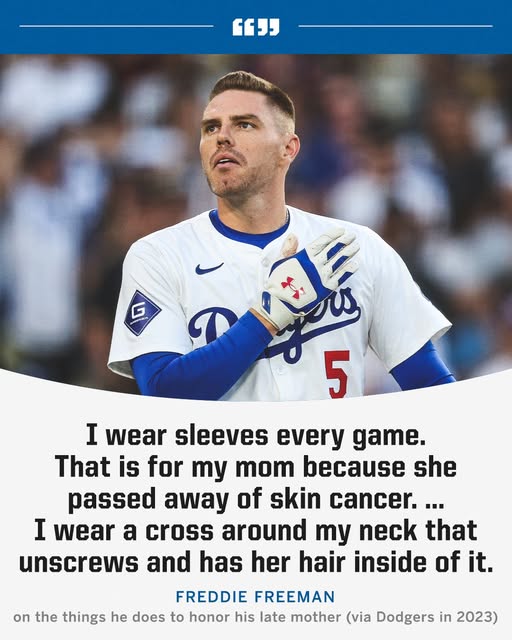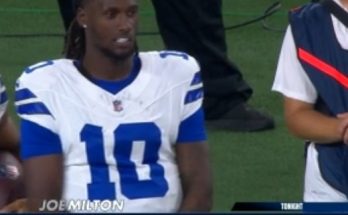Freddie Freeman is one of the most respected players in all of Major League Baseball. From his sweet left-handed swing to his Gold Glove defense at first base, Freeman’s consistency and professionalism have made him a cornerstone of the teams he’s played for, including the Atlanta Braves and now the Los Angeles Dodgers. But beyond his on-field performance, it’s the quiet, meaningful details—like his uniform choice—that tell the deeper story of who he is. For years, Freeman has worn long sleeves in nearly every game, regardless of sweltering heat or weather conditions. The reason? It’s a touching tribute to his late mother, Rosemary Freeman.
Rosemary passed away from melanoma when Freddie was just 10 years old. Her death left an enormous impact on him, shaping the man, player, and father he would eventually become. While many players opt for short sleeves to beat the heat of a grueling MLB season, Freeman has made long sleeves a permanent part of his look—an unspoken homage to the woman who meant everything to him. It’s not about style. It’s not about comfort. It’s about memory, love, and honoring someone who remains a guiding light in his life, even decades after her passing.
In a sport where routines and rituals are as embedded in the game as the bat and ball, Freeman’s sleeve choice is quietly powerful. Baseball players are creatures of habit—every movement measured, every superstition followed. But Freeman’s habit isn’t about superstition. It’s about remembrance. And in an era where players use their platform to speak louder with words or fashion statements, Freeman’s long sleeves speak volumes with a whisper.
What makes Freeman’s tribute even more touching is how subtle it is. It’s not something he draws attention to regularly. He hasn’t plastered it across his social media or worn flashy wristbands in her name. Rather, he allows his actions to speak for themselves. Every time he steps into the batter’s box in long sleeves, he’s bringing his mother with him—keeping her close, not just in heart, but in fabric, ritual, and routine.
Rosemary was a Canadian who moved to California and raised a family with her husband, Fred Sr. According to those close to the family, she was a devoted mother and a source of strength and warmth in young Freddie’s life. Her passing from skin cancer came far too early and left a young boy struggling with grief during his most formative years. Baseball became a refuge for Freddie—a place to find structure and focus amidst pain. And now, more than two decades later, the game that helped him heal has become the stage on which he honors her daily.
It’s also notable that Freeman has built a reputation around being one of the most emotionally genuine and grounded players in the game. Whether it’s getting choked up after hitting a home run on Mother’s Day, embracing an opponent who just hit a big milestone, or taking time with fans and young players, his compassion is as much a part of his legacy as his batting average. It’s no surprise that a man with such empathy would carry his mother’s memory into every game, with something as consistent and symbolic as long sleeves.
Fans often notice his long sleeves and wonder why. Some speculate it’s for sun protection, especially considering his mother’s battle with melanoma. And while that may be part of it, the deeper meaning adds a new layer to that choice. For Freeman, it’s never been about what makes the most physical sense—it’s about what makes emotional sense. It’s about carrying a piece of his past into every inning, every at-bat, every defensive play.
Even in the heart of summer, during a road game in Arizona or a scorching day in Atlanta, you’ll see Freeman pull on those sleeves. There’s no fanfare, no explanation offered unless asked. And that’s what makes it so impactful. In an era where public gestures often come with PR strategy, Freeman’s choice is refreshingly authentic.
His tribute also resonates deeply with fans who have experienced similar losses. Many have taken to social media to share their appreciation, saying things like, “Freddie plays for his mom, and I watch for mine,” or “Seeing someone honor their parent in such a consistent, quiet way is more powerful than any speech.” It’s a reminder that sports, at their best, connect us through shared humanity. Wins and losses come and go, but gestures like these leave a lasting impression.
Teammates, too, have commented on Freeman’s character and consistency. Mookie Betts, Clayton Kershaw, and other Dodgers have spoken about how Freeman brings a professionalism and dignity to the clubhouse that sets the tone for younger players. That influence goes beyond stats or accolades. It’s about being a man of purpose, one who understands where he came from and why he plays the game.
Freeman’s story also highlights how athletes often carry emotional weight that the public rarely sees. Beneath the jerseys and behind the highlight reels are real people with real stories—people who carry loss, love, and memory onto the field. Freeman’s sleeves are a literal and figurative layer of that depth.
In a poignant twist, Freeman has also used his platform to advocate for skin cancer awareness. He encourages fans to get regular checkups, wear sunscreen, and be vigilant about skin health—lessons painfully learned from his family’s experience. It’s a reminder that his tribute to his mother isn’t just symbolic—it’s active, responsible, and potentially life-saving for others.
As a father now himself, Freeman has spoken about how he tries to instill the same values in his own sons that his mother instilled in him. He talks about the importance of love, respect, humility, and perseverance—traits his mother embodied and that he tries to pass down, both on and off the field. Watching him interact with his family, it’s clear her spirit lives on not just in sleeves, but in how he lives.
Even as Freeman continues to add to a Hall-of-Fame-worthy career, the sleeve story stands apart. It’s not part of a stat line. It won’t appear in box scores or MVP ballots. But for those who know, it defines something even bigger: the heart behind the hustle, the soul behind the swing.
Every time Freddie Freeman steps onto the diamond, he plays not just for the Dodgers, not just for the fans, and not just for himself—but for a mother who left too soon, whose love still drives every game. In a sport filled with numbers, it’s this quiet tribute—woven into every inning—that tells one of the most meaningful stories in all of baseball.
Freddie Freeman is more than just a great ballplayer. He’s a son honoring a legacy, one sleeve at a time.



